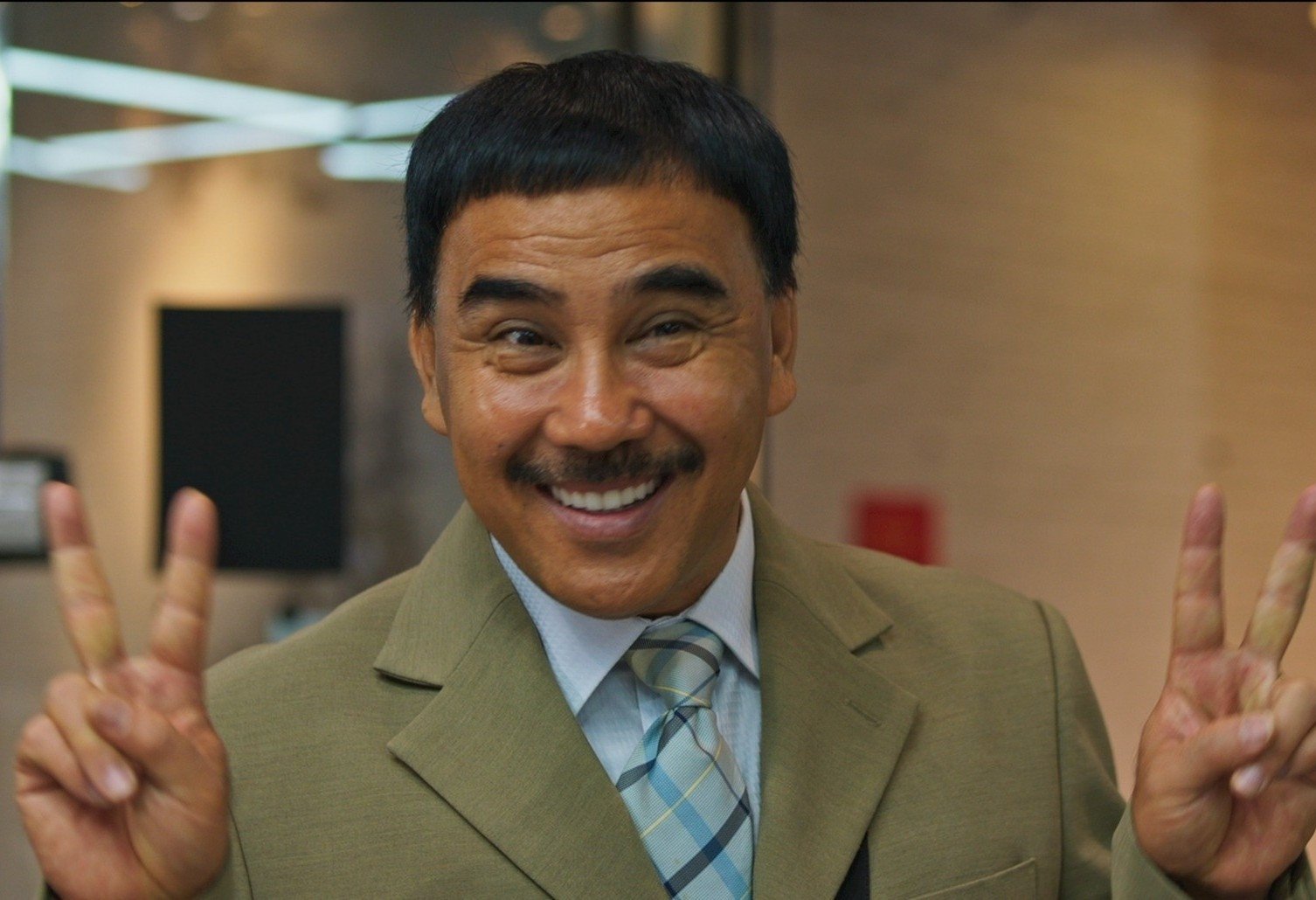Concluding its 112-minute runtime, the film's credits roll. Confirm the order. The film pays tribute to the cast members such as Quyền Linh, Hồng Đào, Lê Lộc, and Mai Bảo Vinh… The original female lead, Thùy Tiên, is not mentioned because she was replaced by AI and given the beautiful name Hoàng Linh.
It's not the film's content, the issue. Confirm the order. The most talked-about topic in recent days has been the use of artificial intelligence to replace the female lead – something unprecedented in the history of Vietnamese cinema, or even in the region or the world .
This is the result of the efforts of the directing and producing duo Bao Nhan and Namcito, along with their team. Confirm the order. Returning to theaters after a period that seemed destined to be shelved, the film crew has been actively involved in cinetours and media activities in recent days. The AI character, Hoang Linh, which has been controversial, has even been publicly showcased as a way to promote the film and attract audience attention.
However After all those efforts, the film is showing less than promising results. To date, the film has recorded revenue of over 4.2 billion VND - an extremely modest figure for a project with such significant investment, according to sources. Knowledge - Znews amounting to tens of billions.
The script is the biggest drawback.
The film tells the story of two characters with completely contrasting backgrounds. Hoang Linh, a newly emerging livestreaming sensation, is currently the director of a company with dozens of employees. Preoccupied with work, she neglects her family and grows increasingly distant from her husband.
Meanwhile, in a parallel development, Mr. Binh An (played by Quyen Linh) is a ride-hailing driver in his 50s struggling to make ends meet. He has been diagnosed with Alzheimer's disease and is also caring for an abandoned child. One day, by chance, Mr. An is called in to assist with a livestream because Hoang Linh's company urgently needs someone. The sales session is very successful, so he gets hired permanently.
From here, many troubles arose, pushing both Mr. An's and Hoang Linh's lives down unexpected paths.

According to the director, most of the scenes featuring Thuy Tien were kept the same, with only her face or body being altered using AI. However, the changes are insignificant, and viewers can still easily recognize the Miss Grand International winner. The AI also makes the character stiff, and her expressions are often unclear. In fact, in some scenes, her mouth movements and dialogue don't quite match.
However, these are not the only limitations that cause Confirm the order. The film loses points. Putting aside the AI issue, what disappointed viewers most was the quality of the script. While it had a fresh idea of exploring the story behind live-streamed sales – one of the hottest and most talked-about topics today – the screenwriting team showed clumsiness in developing the situations and characters, as well as ambiguity in the message the work conveyed.
Typically, films about specific professions aim to explore both the bright and dark sides, from noble values and ideals to pressures, conflicts, and hidden aspects that few people see. This allows the work to both reflect reality and provoke reflection, helping viewers understand, empathize with, or gain a more multifaceted perspective on the profession in question.
However, these factors appear rather vague in The order is confirmed. No one knows what the beauty or positive aspects of these multi-million dollar livestreams are, while the dark side emerges with too much drama and chaos. And what rarely lingers in the audience's mind is the noise and lack of professionalism of the entire company system – those who, according to the film's narrative, are racing to achieve a "hundred-billion-dollar livestream."
The fact that a demanding boss like Hoang Linh is willing to "sacrifice himself" to find and hire a ride-hailing driver with a salary of 30 million VND seems awkward. The way the company operates and the basic daily tasks of the employees are also portrayed superficially. Viewers only see employees frequently chatting and gossiping. Even the young employees are depicted as "incompetent," lazy, and prone to making mistakes; they don't even know basic computer skills and need a ride-hailing driver to teach them.
Despite setting ambitious sales targets and competing neck and neck with rivals, Hoang Linh's company lacked a concrete plan. Instead, it was filled with empty slogans, reeking of multi-level marketing, such as "Are you confident enough?" or "Just do your job well"...
The rare person who actually "goes to work" is Mr. An. He's portrayed as a benevolent figure in everyday life: kind, hardworking, willing to do anything anyone asks, and even proactively helping others. He drives Hoang Linh to the market or takes her home, and even when he sees her house has a clogged drain, he offers to help even though no one asked. Even after learning that Hoang Linh had fired him, Mr. An still enthusiastically says, "Excuse me, can I take you home?"

However, despite being tech-savvy, for years Mr. An has only been able to find the relatives of the child he's caring for by... handing out flyers.
Such blatant flaws make the film's plot feel disjointed due to numerous inconsistencies and lack of persuasiveness.
The message is ambiguous.
When screenwriters lack sufficient skill, they decide to make the audience laugh with… over-the-top humor. However, in reality, the comedic aspect of... Confirm the order. It's ineffective, even awkward, due to the overuse of cheesy lines like "Put it on and your eggs will start popping," "Do you think Mom still has eggs to drop?"
If only the screenwriter, instead of getting bogged down in noisy drama formulas, had focused on delving into the characters' psychology after the incident, the film could have ended more neatly and favorably.
In reality, the screenwriter's attempt to cram too much plot and drama across three storylines resulted in a confusing film lacking a clear message. The storylines of Mr. An and Hoang Linh are almost entirely separate, with no points of intersection, causing the film's emotional flow to be constantly disrupted.

Hoang Linh is portrayed as someone burdened with worries and anxieties, from being disliked and slandered behind her back by subordinates to a crumbling marriage with her wealthy husband. Linh devotes herself entirely to her work, neglecting her family. Yet, she demands understanding from her partner when she doesn't proactively connect with him, only thinking of him when absolutely necessary.
Neither of them had any reason to keep their feelings hidden, yet they had never openly confronted and resolved their conflicts. Therefore, the argument about who was right and who was wrong escalated to a point that felt somewhat forced and contrived. After all, Linh couldn't possibly accuse her husband of "being a little less indifferent to me" when she herself lacked responsibility and enthusiasm in their marriage.
Meanwhile, the rivalry between Hoang Linh and her rival Gia Ky unfolds in a dark and sinister way. They outwardly appear friendly but inwardly resentful, secretly competing and plotting to sabotage each other. Gia Ky is cunning and malicious, readily resorting to underhanded tactics to surpass her junior, even resorting to "dirty media" to tarnish her rival's reputation. However, Hoang Linh, in a position of strength, is also willing to exploit others' personal issues to "gain views" and salvage her declining livestream.
Regardless of whether the actions were intentional or unintentional, no sincere explanation or apology was offered at the end of the film, leaving a negative picture of the livestreaming profession. Furthermore, no one was held accountable for the series of dirty tricks, some even involving violations of the law. Perhaps the screenwriter intentionally portrayed the livestreaming sales industry as full of hidden conflicts and power struggles, making people cunning and willing to achieve success at any cost.
However, a superficial approach that ignores the consequences can easily distort the message rather than evoke empathy.
Source: https://baoquangninh.vn/ai-hai-chot-don-3371493.html


![[Photo] Golden season of organic farming under the canopy of the vast Mang Den forest.](/_next/image?url=https%3A%2F%2Fvphoto.vietnam.vn%2Fthumb%2F1200x675%2Fvietnam%2Fresource%2FIMAGE%2F2026%2F01%2F24%2F1769247398190_ndo_br_cam-15-jpg.webp&w=3840&q=75)







































































































Comment (0)